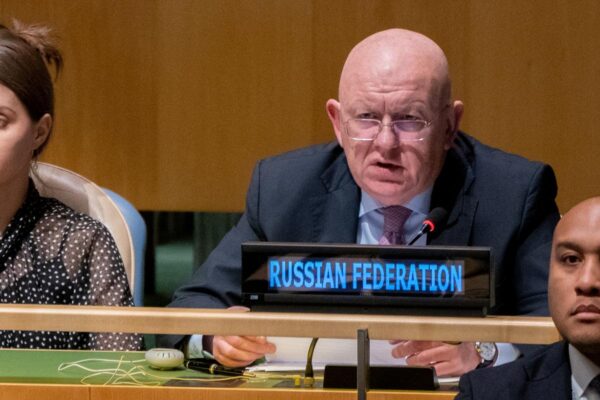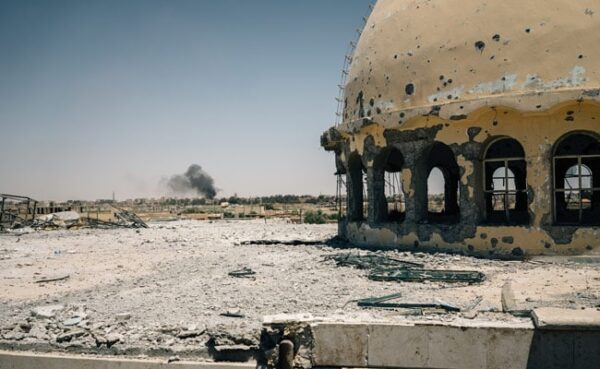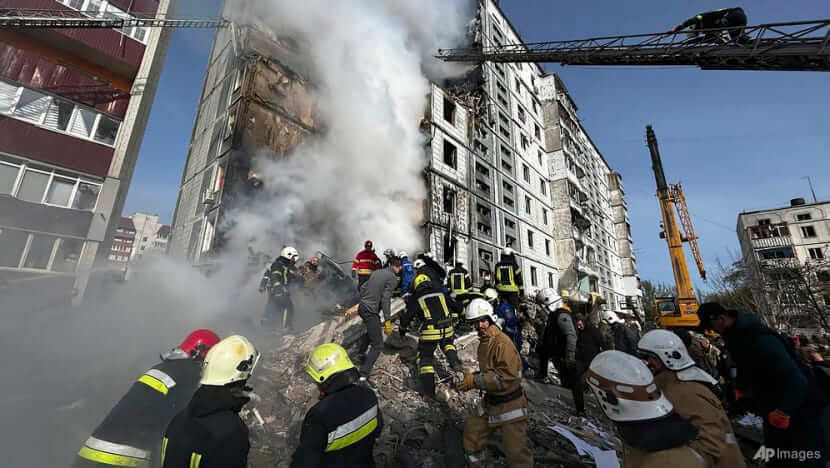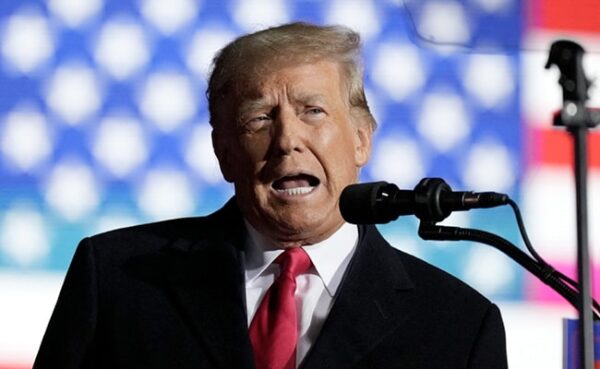TheU.N. General Assembly suggested overwhelmingly Wednesday to condemn Russia’s “ tried illegal annexation ” of four Ukrainian regions and demand its immediate reversal, a sign of strong global opposition to the seven- month war and Moscow’s attempt to snare its neighbour’s home.
The vote in the 193- member world body was 143- 5 with 35 abstentions. It was the strongest support from the General Assembly for Ukraine and against Russia of the four judgments it has approved since Russian colors raided Ukraine on February 24.
Ukraine’sU.N. minister, Sergiy Kyslytsya, called the vote “ amazing” and “ a major moment.”U.S. Ambassador Linda Thomas- Greenfield said sympathizers were “ holding our breaths” and called it “ a monumental day.” European Union Ambassador Olof Skoog called it “ a great success” that sends “ a resounding communication to Russia that they’re and remain isolated.”
S. President Joe Biden said in a statement that the vote demonstrated the world “ is more united and more determined than ever to hold Russia responsible for its violations. ” It’s “ a clear communication ” that “ Russia can not abolish a autonomous state from the chart ” and it “ can not change borders by force, ” he said.
The Western- patronized resolution was a response to Russia’s blazoned annexation last month of Ukraine’s Donetsk, Luhansk, Kherson and Zaporizhzhia regions. Moscow acted following Kremlin- orchestrated “ blackballs ” that the Ukrainian government and the West have dismissed as sham votes conducted on engaged land amid warfare and relegation.
Violation ofU.N. Charter
During two days of speeches at the assembly’s proceeded exigency special session on Ukraine speaker after speaker indicted Russia of violating crucial principles of the United Nations Charter — respect for the sovereignty and territorial integrity of allU.N. member nations.
There was violent prompting by sympathizers of theE.U.- eased resolution ahead of Wednesday’s vote.
S. envoy Thomas- Greenfield told the assembly before the vote that when the United Nations was established on the ashes of World War II it was erected on an idea — “ that noway again would one country be allowed to take another’s home by force. ”
subsequently, she told journalists the vote means “ that in the eyes of the world and the United Nations, Ukraine’s borders remain the same.”The resolution also sends an tremendously important signal to Moscow and to everyone It doesn’t count if you as a nation are big or small, rich or poor, old or new. If you’re aU.N. member state, your borders are your own and are defended by transnational law,”Ms. Thomas- Greenfield said. “ They can not be redrawn by anyone differently by force.”
Result beyond prospects
A crucial issue for the resolution’s Western backers was how numerous countries would support it, and the result went beyond their most auspicious prospects.
The General Assembly suggested 141- 5 with 35 abstentions March 2 to demand an immediate Russian ceasefire, pullout of all its colors and protection for all civilians. On March 24, it suggested 140- 5 with 38 abstentions on a resolution condemning Russia for Ukraine’s philanthropic extremity and prompting an immediate ceasefire and protection for millions of civilians and the homes, seminaries and hospitals critical to their survival.
But the assembly suggested by a far lower periphery April 7 to suspend Russia from theU.N.’s Geneva- grounded Human Rights Council over allegations Russian dogfaces in Ukraine engaged in rights violations that the United States and Ukraine have called war crimes. That vote was 93- 24 with 58 abstentions.
A 2014 resolution affirming Ukraine’s territorial integrity and declaring the vote that led to Russia’s annexation of the Crimean Peninsula illegal was espoused by a vote of 100- 11 with 58 abstentions.Among the surprise sympathizers of Wednesday’s resolution were the “ yes ” votes from Saudi Arabia, the United Arab Emirates and other members of the Gulf Cooperation Council as well as Brazil.
Russia responds
Russia’sU.N. minister, Vassily Nebenzia, had appealed to countries to bounce against the resolution, calling it “ a politicised and openly instigative document ” and denouncing its guarantors as “ unconscionable Western racketeers ”. He expressed remorse the vote wasn’t by secret ballot, as Russia sought but the assembly rejected.
Nebenzia reiterated Russia’s claims the blackballs were valid, saying “ the populations of these regions don’t want to return to Ukraine. ”
The four countries that joined Russia in advancing against the resolution were North Korea, Belarus, Syria and Nicaragua.Ukraine’s Kyslytsya expressed profound remorse that the four countries made “ the wrong choice against theU.N. Charter” and prompted them to review their commitment to theU.N.’s principles.
India abstains
Among the 35 countries that abstained, 19 were from Africa, including South Africa. China and India, the world’s two most vibrant countries, also abstained along with Pakistan and Cuba.
The more important Security Council, whose judgments are fairly binding, has been stymied on taking action on Ukraine because of Russia’s proscription power, which it used September 29 to block commination of Russia’s attempts to addition Ukrainian home.
Not fairly binding
By discrepancy, the General Assembly, where there are no interdictions, has now approved four judgments criticising Russia over Ukraine. Its votes reflect world opinion but aren’t fairly binding.
The resolution espoused Wednesday declares that Moscow’s conduct violate Ukraine’s sovereignty and territorial integrity, are “ inconsistent ” with the principles of theU.N. Charter, and “ have no validity under transnational law and don’t form the base for any alternation of the status of these regions of Ukraine ”.
It demands that Russia “ incontinently, fully and unconditionally withdraw all of its military forces from the home of Ukraine within its internationally honored borders ”.
And it supports “ the deescalation of the current situation and a peaceful resolution of the conflict through political dialogue, concession, agreement and other peaceful means ” that respect Ukraine’s sovereignty, territorial integrity and internationally recognised borders.
What the countries said
numerous countries among the further than 70 speakers prompted a negotiated end to the war. TheE.U.’s Skoog called the appeal for a peaceful result “ veritably important,” but stressed it must be grounded on Ukraine’s territorial integrity.
During Wednesday’s debate there was strong support for the resolution.Australian Ambassador Mitch Fifield called Russia’s tried annexation “ illegal and a dangerous escalation ” and prompted all countries to oppose acts of aggression.
Ambassador Fergal Mythen of Ireland said choosers in the “ sham ” blackballs in the four regions “ faced intimidation by the Russian service and Russia’s illegitimately appointed authorities ”.
Cambodian Ambassador Sovann Ke did n’t indicate how he’d bounce but said that “ the forcible annexation of regions from a autonomous country is a obvious violation of theU.N. Charter and transnational laws, which isn’t respectable ” and prompted that internationally admired borders “ be completely admired. ” In the voting, Cambodia supported the resolution.
South Korea’s minister, Hwang Joonkook, gave unambiguous support “ to the sovereignty, political independence and the territorial integrity of Ukraine. ” He said his country’s “ own painful gests ” after the 1950- 53 Korean War “ can swear that any attempt to divide a nation in any form or system is simply the morning of lasting veritably serious troubles, rather than a result ”.
North Korea backs Russia, slams the West
On the other side of that peak, North Korean Ambassador Kim Song supported the “ tone- determination ” of the people in the four regions adjoined by Russia as a right defended in theU.N. Charter and said the results must be admired.
He indicted the United States and Western countries of “ severely ” violating the sovereignty and territorial integrity of former Yugoslavia, Afghanistan, Iraq and Libya under “ the rationale ” of promoting transnational peace and security without ever having its conduct called into question by the Security Council. He argued thatU.S. hindrance in the internal affairs of countries is continuing in the 21st century.
Syrian Ambassador Bassam Sabbagh indicted the General Assembly of “ being manipulated flagrantly by some Western countries for their own geopolitical interests ” and prompted countries to oppose sweats “ to insulate Russia and to employ double norms”.




